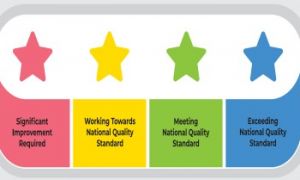Conducting performance reviews is an effective way to recognise and reward individual educators contributions within the service. The purpose of performance reviews is to assess the performance of individual educators and to improve communication between Educators and management.
The Aim Of The Performance Reviews
- Identify performance issues early
- Provide feedback
- Build skills and confidence
- Set clear performance measures
- Keep educators motivated and accountable.
- Reward educators who are bringing value to your business.
- Use review processes to evaluate performance and behavioural issues and take steps to address them.
- Identify training and development needs and help staff plan their career development.
- Set targets for educators performance that help you address inferior performance.
- Acknowledge the contribution and achievements of employees, and encourage a culture of continuous improvement
- Foster and provide opportunities for reflective practice for educators
- Identify career pathways and PD opportunities for Educators
- Improve the Educators understanding of how their performance contributes to the overall goals of the organisation
- Improve the understanding and communication between the Educator and employer
- Contribute to the overall improvement of the quality of the services provided by the organisation
- Assist the service to achieve its objectives and goals, and to meet legislative and funding requirements
- To make informed personnel decisions regarding promotion, job changes, and termination
- To identify what is required to perform a job (goals and responsibilities of the job)
- To assess an Educator's performance against these goals
- To work to improve Educator's performance by naming specific areas for improvement, developing a plan aimed at improving these areas, supporting the Educator's efforts at improvement via feedback and assistance, and ensuring the Educator's involvement and commitment to improving their performance.
The Annual Performance Evaluation Meeting
The annual performance evaluation meeting involves the employer and Educator's meeting to discuss the performance over the past 12 months. It is assumed that both the parties come prepared for this meeting to discuss their assessment and reflections.
It may involve the following additional steps:
- gathering evidence as required to demonstrate achievements, particularly if there are significant inconsistencies in the assessments undertaken by the employer and Educator
- planning, selecting and confirming the Key Performance Indicators
- any goals and Quality Improvement Plan (QIP) areas to be the focus of the Educator for the next 12 months
- documenting the agreement reached and signing in proof of acceptance.
During The Performance, Reviews
- Make sure your statements are fact-based supported by documented incidents
- Don’t make it personal. Make sure your statements are performance and not personality-based.
- Give recognition of successes and achievements and encouragement
- Spell out clearly and positively the areas where improvement is required
- Encourage the team member to discuss his or her job performance, how they feel they are performing and any relationship or other problems he or she may be experiencing
- Resolve any grey areas so that mutual respect and motivation can be achieved
- Be objective and factual – have data to support your comments
- Do not react to comments by placing the blame on others – you should maintain confidentiality
- Ensure that you encourage and tell the team member that he or she has done a good job where appropriate, and don't just focus on the areas needing improvement.
- Providing Feedback
Effective communication is vital to managing performance and can ensure a harmonious working relationship and workplace. Creating an environment of open and honest communication can also lead to better outcomes for children and their families by fostering greater understanding between Educator and employer and improving relationships and strengthening collaboration.
Tips For Providing Feedback
- Make both positive and constructive feedback regular and timely (as soon as possible after the event).
- When providing feedback about concerns: – plan your feedback and make it constructive – provide specific examples i.e. based upon evidence and facts
- Focus feedback on the Educator's observed behaviour and avoid making feedback personal.
- Engage in dialogue and encourage the educator to participate. Do not make the discussion top-down.
- Ensure that the educator understands the concerns and expectations, and leaves knowing how to address the concerns.
- Ensure that the educator understands what support is available and how to access it.
- If there is a follow-up process agreed to, ensure that the educator knows when it will occur, and what they are expected to demonstrate i.e. improvement in performance, training and development etc.
As with any conversation, building a good rapport with Educators will make the conversation easier. Rather than rushing straight into feedback, be sure to take some time to build a positive and harmonious environment first.
Finish on a positive note, highlighting the Educator's greatest achievement. This will ensure that the educator leaves the meeting secure in the knowledge that their contribution is acknowledged and valued and is inspired to address the concerns identified.
Examples Of Performance Reviews
Job knowledge and Work Output
- Understands the primary objectives of the position
- Understands the expectations of the service with regard to families
- Has the qualifications and practical aptitude for the position
- Can practically apply policies and procedures
- Understands and takes ownership of the Service’s Philosophy and it’s revision and implementation
- Understands the National Quality Framework (Early Years Learning Framework, National Quality Standards and the
- Education and Care Services National Regulations)
- Completes tasks on time and meets objectives: (Checklist-OH&S, Programming, Observations and Day Journal)
Attitude
- Has a positive attitude and frequently has a smile on their face
- Is cheerful who always makes you feel delighted.
- Has an even demeanour through good times and bad.
- Has an authentic approach and genuine interest to children and families
- Understands and supports family involvement in the Service
- Looks for opportunities to include family feedback in the program
- Has the knowledge and motivation to seek support and information for families
- Does not engage in negative talk about any stakeholders in the service- families, children, colleagues, management or community members
- Is actively involved in the Service’s Quality Improvement Plan
- Attends all staff/team meetings and contributes to the agenda and outcomes
- Works productively with colleagues
- Participates in their own professional pedagogy reflection, focusing on their professional practice. (Especially those aspects that involve building and nurturing relationships, curriculum decision-making, teaching and learning.)
- Participates and implements the Service’s Staff Goals exercise throughout the year
- Has a natural rapport with others and does very well at communicating with others
- Has a knack for making people feel important.
- Provides opportunities for teamwork and forms connections.
- Has a natural ability to work with people is a great asset to the team.
Leadership
- Takes ownership
- Sets clear direction
- Is decisive and takes clear action that is in keeping with the Service’s policies, National Quality Framework and families’ expectations
- Expresses empathy and role models for the children
- Is flexible and adaptable to the environment, routine, program and needs of children, families and colleagues
- Empowers all stakeholders in the Service using a variety of resources
- Demonstrates integrity
- Works as part of a professional team of Educators
- Leads by example
- Respects diversity
- Is approachable and communicative
- Are respectful and ethical in their approach
Decision Making
- Able to make sound fact-based judgments
- Able to work out multiple alternative solutions and determines the most suitable one.
- Be objective in considering a fact or situation.
- Be firm to not let the individual emotion and feeling affect on the made decision
Team Work
- Manages relationships in a professional manner.
- Contributes to the success of the team on a regular basis.
- Task gets accomplished within the team.
- Is a team player and understand how to help others in times of need.
Family Focus
- Seeks out families who require assistance
- Has an approachable manner
- Engages families looking for ways to establish trust and a reciprocal relationship where information can be shared, discussed and continuity achieved
- Shares information with families using the family’s preferred method of communication
- Represents families ideas, concerns and goals in the child’s goals, program and Service’s Quality Improvement Plan
- Has great knowledge of the resources and support services that can be made available to families for a variety of circumstances
By talking to Educator's about their performance, you can promote a culture of open communication, discuss any weaknesses or problems your Educator have and help them find solutions. Create discussions that help you ensure you're taking care of your staff and giving them the best chance of developing, achieving and rising in their roles.
References:
Early childhood: Performance appraisal or review, Australian Education Union
Performance Evaluation and Development Planning, Early Learning Association Australia
Appraisal Systems, Early Childhood Council
Staff Performance Review, Childcare Centre Desktop







 As an Educator in Australia, your pay rate falls under the Children’s Services Award 2010. This award states the minimum amount that an employer can
As an Educator in Australia, your pay rate falls under the Children’s Services Award 2010. This award states the minimum amount that an employer can When working as a qualified Early Childhood Teacher (with a university degree) within a service, your rate of pay will come from the Educational Services
When working as a qualified Early Childhood Teacher (with a university degree) within a service, your rate of pay will come from the Educational Services When working as a Diploma Qualified Educator your pay rate is from the Children's Services Award 2010. This Award states your minimum rate of pay
When working as a Diploma Qualified Educator your pay rate is from the Children's Services Award 2010. This Award states your minimum rate of pay When working as a Cert 3 Qualified Educator, your pay rate is from the Children's Services Award 2010. This Award states your minimum rate of
When working as a Cert 3 Qualified Educator, your pay rate is from the Children's Services Award 2010. This Award states your minimum rate of Educational Leaders play a crucial role in their early childhood service by ensuring that the educational program aligns with best practices and supports the holistic
Educational Leaders play a crucial role in their early childhood service by ensuring that the educational program aligns with best practices and supports the holistic In early childhood education and care, ratios are more than a technicality—they are a frontline safeguard. Every child deserves responsive supervision, emotional connection, and developmental
In early childhood education and care, ratios are more than a technicality—they are a frontline safeguard. Every child deserves responsive supervision, emotional connection, and developmental With the new national child safety reforms kicking in on 1 September 2025, early childhood services like yours have a real opportunity to lead the
With the new national child safety reforms kicking in on 1 September 2025, early childhood services like yours have a real opportunity to lead the Here’s a comprehensive Mobile Phone and Smart Watch Policy tailored for early childhood education and care (ECEC) services in Australia, aligned with the latest 2025
Here’s a comprehensive Mobile Phone and Smart Watch Policy tailored for early childhood education and care (ECEC) services in Australia, aligned with the latest 2025 The Sea of Fish Challenge is a national initiative that invites children, educators, families, and communities to create and display fish artworks as a symbol
The Sea of Fish Challenge is a national initiative that invites children, educators, families, and communities to create and display fish artworks as a symbol Across the early childhood education and care sector, educators are sounding the alarm: current staffing ratios are insufficient to deliver safe, meaningful, and developmentally appropriate
Across the early childhood education and care sector, educators are sounding the alarm: current staffing ratios are insufficient to deliver safe, meaningful, and developmentally appropriate


